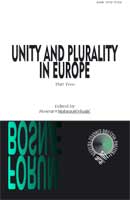THE COMMUNITY OF LOSS: TOWARDS A POLITICS OF PLURALITY AND VULNERABILITY
THE COMMUNITY OF LOSS: TOWARDS A POLITICS OF PLURALITY AND VULNERABILITY
Author(s): Olivia GuaraldoSubject(s): Politics / Political Sciences
Published by: Međunarodni forum Bosna
Summary/Abstract: It seems the crucial question of the present, with its conflicts between old and new and unexpected political scenarios, concerns the form of the new polity. Political thinkers, policy makers, the politically aware masses, strategic experts, religious, ethnic, regional groups, terrorists alike are all wondering in their different ways what awaits us at the end of modernity. What is the form that politics will most likely take after the proclaimed end of its absolute modern protagonist, namely the State? What does the so-called era of globalization bring forth in terms of political – not only economic – consequences? Many thinkers agree on one undisputable fact: the end of a political era offers new and unexpected possibilities by opening up the old, rigid boundaries of a State-based politics that has ruled in the West for at least 300 hundred years. Policy makers have reacted to this new opening in different ways: some still pretend that nothing has changed and that the old Modern State is still ‘alive and kicking’; some others have taken the opportunity to celebrate the end of a scattered politics of conflicting Leviathans and the rise of a world-governing Empire. Considering the devastating effects of both views, easily exemplified on the one hand by the feckless policy of the European Union and on the other by the destructive hyperactivity of the United States, I prefer to keep company with those political thinkers who see the present as characterized by a truly unprecedented liberation from old categories and a boundless possibility to recast the terms according to which politics and political subjectivities can be understood. In this perspective, I would like to draw attention towards a political dimension that seeks to depart from the Modern and its paradigms. By referring to Hannah Arendt’s idea of politics, I am interested in thinking about new forms of political agency and political spaces that enhance human plurality and avoid positing compelling universal features of commonality. The very notion of politics as State-based, subject-oriented and territorially enclosed seems unable to understand and to govern contemporary reality. Moreover, it seems unable to modify its theoretical and lexical “arsenal” in order to open new critical scenarios of both understanding and acting. This incapability, this stillness or rigidity, in my opinion, derives both from its inability to ‘adapt’ and modify its paradigms, as well as the obsolescence of the terms upon which it has been founded.
Journal: Forum Bosnae
- Issue Year: 2007
- Issue No: 39
- Page Range: 197-206
- Page Count: 10
- Language: English
- Content File-PDF

